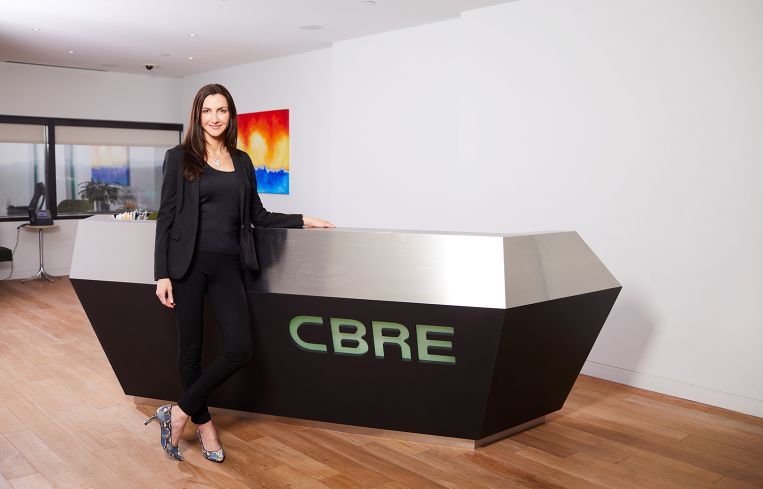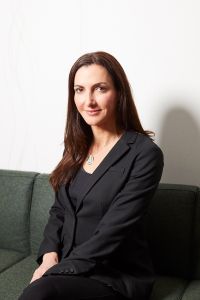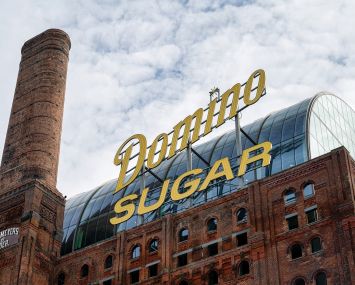CBRE’s Karly Iacono Talks Net Lease, YouTube and Pandemic Lessons Learned

It’s not easy to become a top net lease broker in one of the most competitive real estate markets in the world. It’s even trickier when you’re a woman.
While the industry has taken noticeable strides in terms of leveling the playing field for women and people of color, it’s still only in the early stages of real change. Karly Iacono said she’s been to networking events with more than 100 people in attendance where she was the only woman in the room.
“We still have so far to go as an industry,” she said.
Iacono is a senior vice president in CBRE’s capital markets and investment properties group as well as a senior adviser within the firm’s net lease property group. That group consists of a national team of top brokers in major U.S. metro areas, all of whom focus on single-tenant assets and net lease portfolios nationwide, according to the website Traded. Iacono focuses mainly on owners with national expertise in net-leased sales and acquisitions, corporate sale-leasebacks and single-tenant developments, according to Traded.
Commercial Observer sat down with Iacono recently as she shared her journey to the top of her field, and her experience as a team leader and a mentor for women in the industry, plus her role as a YouTube celebrity.
This interview has been edited for clarity and length.

Commercial Observer: You joined CBRE as a senior vice president in February 2021 after seven years at Marcus & Millichap. How was that transition for you?
Karly Iacono: We came into the office to set up our equipment and we had all this space, but nobody was in the office. It was very difficult to make meaningful relationships virtually, but CBRE was incredibly supportive of our team and the business, and helped facilitate and launch Zoom meetings with people throughout the company.
We’re now back in the office — more than we’re not in the office — which is great. So, I’m feeling like the relationships are finally solidifying. We have lots of referral business coming in, and I think that just speaks again to the need for in-person work. There’s nothing like relationship building in person.
What does your schedule look like today?
I’m in the city once a week. As a broker, if you’re in the office five days a week, you’re doing something wrong. If you’re out of the office five days a week, you’re doing something wrong. It’s got to be a balance between your office connections, your time with your clients networking and prospecting, and viewing properties. So the office is the home base, now more than it was a year ago, but I’m often out and about as well.
How would you describe the evolution of the net lease sector through the pandemic?
Net lease performed exceptionally well through the pandemic, better than anyone expected. We knew the tenants were strong, but it has really outperformed. And because the single tenants did better than a lot of the other retail tenants, it’s become a more institutionalized asset class. We have three new private equity funds — and more institutional investors than we’ve ever had — coming into the net lease space and diversifying out of other asset classes. Historically, net lease has been a very fragmented, private client, one-off transaction sector, and that’s changing. And I think that’s been the most interesting shift to watch.
CBRE put out [research at] the end of ‘21, which showed that institutional and equity funds accounted for $6.3 billion in transaction volume at the end of [the year], which was a 99 percent increase from the year prior. Huge numbers. Net lease investment volume by [real estate investment trusts] also increased 141 percent year over year in Q2 2021, to $2.3 billion. So we just see a lot of activity from different types of investors, coupled with private client demand being off the charts because it’s considered a very stable, long-term investment in this case.
Then, with the volatility of the markets and in the world, we’re seeing a flight to quality and a lower tolerance for risk from investors, and a lot of them are transitioning from the stock market and other asset classes to net leases because of the very long-term leases, the nature of the tenants and how they performed the last few years, despite all of the volatility. There’s not enough inventory to meet demand, so it’s fueling a lot of the competition in the net lease sectors.
Who are the major investors and tenants today?
We’re seeing amazing demand for long-term leases with investment-grade tenants. We’re seeing major investor demand for 7-Eleven, which is expanding. Another one is Walgreens because of its credit and long-term leases. All of the fast-food brands are expanding. The drive-thru [concept] did incredibly well from an adaptation perspective over the last two years in terms of both performance and investor demand. And that’s Taco Bell, Popeyes, Bojangles, KFC, McDonald’s — all of them have really done well. There are other sectors that were hit a little harder that are just starting to bounce back, such as day care, gyms, things you might expect. But, for the most part, all were able to remain open, adapt and have strong sales.
What was the biggest challenge to your business during COVID, and what was the biggest client ask?
One of the biggest challenges of being a broker is how to manage buyer and seller expectations and timelines. This was really exacerbated throughout COVID because third-party reports are taking longer; your environmental inspections, your surveys, all the things that are necessary to get done during due diligence were just taking a long time. So, managing the timeline and the expectations of how the deal will unfold from both sides is a challenge.
The other piece was the lack of new development. Development was basically put on hold for 2020, and that was because municipalities were shut down and couldn’t issue approvals. Construction materials are still very tough to get. So development was severely delayed in 2020. It’s now coming back, projects are getting done and things are coming to market, but we had this span of time where there was a lack of new net-lease products that we were able to sell for our developer clients. That’s been a challenge and something that we work closely with our clients on, because of all those different construction challenges.
And, then, as always, buyers and sellers have different opinions on pricing. Sellers still know that there’s a lack of product and buyers still want to price in the potential interest rate increases. We’re finding that having everyone meet on the same page is challenging.
How are you and your team addressing those issues?
It goes back to relationships like everything. We like to run a very tight deal process because time kills deals and we want to get everyone the information they need as efficiently as possible so we can move the deal forward. We have relationships with vendors throughout the country. It’s relationship-driven and knowing who to call to get things done. So, we’re helping our clients get faster answers and managing the deal process more than we ever have, just to make sure that all of this stuff gets done.
How long have you been working as a net lease broker?
I’ve been in real estate a really long time, starting back in 2004. My first job right out of college was in litigation consulting on the financial side of legal cases. So we were basically running all the financial models across lots of different industries so our senior team could then present in court on whatever the litigation issue was. It was super boring but gave me amazing attention to detail that I still carry with me today. So that was a good sounding board.
I left that job after a year, and then I went into real estate from that point. I did some development work with my family for a few years, and then came to work in net lease. I’ve been in net lease eight years now.
Was it family influence that first got you interested in real estate?
Yes, my father is a broker and developer. So I grew up spending the summers with him, going to meetings. I went everywhere with him, so I learned how to negotiate through him, how to interact with clients, how to talk to anybody anywhere and how to relate to a wide variety of people. He also taught me great things, like: You never know where the business will be coming from, so treat everyone like a prospect and a connection.
I still do this today. I talk to people almost everywhere I go. I met a potential client buying hiking boots last year. So you never know! I value those connections and the people, and I try to give back, which I think is part of the reason I’ve been able to create such a strong network.
Is working in real estate something you always wanted to do?
No, actually I wanted to be president. I was curious when I was a kid so that was the goal. And then I worked for my state senator while I was in high school and decided that, actually, I didn’t love politics and all the other things that came with it. I wanted to have more control over my destiny and not be beholden to voters or donors. It was not going to be the right fit for the type of life I wanted to live. I knew I wanted to be in business.
What do you like about New York’s real estate industry?
It is never dull. No day is ever the same. No deal is ever the same. It’s very challenging. I enjoy solving complex problems. I like progress. And I like limitless opportunities, which my role in commercial real estate affords. It’s not easy but I feel like every day I have the opportunity to progress, grow, make more money, and meet someone different.
What did the experience of the past two years teach you about yourself as a leader?
I think adaptation and flexibility is the most important skill for any of us in business. I didn’t do well with change before. I wanted things to go a certain way, which is great in a lot of situations, not so much when the whole world is changing every two weeks. So, just getting through the last few years has made me not only a better broker but a better leader. I realized that there are a lot of ways to do things, and we have to keep improving. If we’re doing something the same way for too long, I feel like that’s now the problem. How do we now look for changes instead of trying to fight them?
Between being a team leader and a broker, which do you prefer?
I definitely enjoy making deals. I love networking and being out in the industry finding new opportunities. But I also enjoy watching people grow and helping people in the business, whether they’re on my team or they’re someone who is newer to the industry. Whomever it is, I like giving back and helping people expand in their roles in their careers too.
You created a popular YouTube series about commercial real estate called “CRE Fast Five.” What’s the story behind that?
It was pre-pandemic. We [Iacono and her Marcus & Millichap team] came up with this idea at the end of 2019 and launched it at the beginning of 2020. So it’s been almost two and a half years. And it was driven by a need for efficiency. I was having the same conversations with new clients over and over: “What’s a letter of intent? How do 1031 exchanges work? What factors should I be looking at when I evaluate a net-leased property?” All these things are very time-consuming. I would spend five, six hours a day talking to new clients, which was great, but it was so much time; after a while, I realized there’s just one of me. So I hoped that there was a way I could reach more people and have these conversations at a much greater scale. So that’s why the series was started.
Our first few episodes were very educational. We would meet someone, have an intro call, and we would start sending them the educational materials to review and watch before we met in person. Amazing time-saver. Then, two months after launching the series, COVID happened. The world shut down all of a sudden and we couldn’t meet people. And it morphed into something different and a lot bigger. It became a way to maintain visibility in the industry; to network when nobody could network; to expand our reach; and meet new brokers and clients; to become a thought leader in retail real estate; to be a source for people who were no longer meeting with brokers and going to ICSC events. They were watching the news, but we wanted a digestible format for people to connect with our team and myself.
What is the key challenge or concern today for women interested in the industry or already working in the industry?
Many different concerns, and I think it depends on what role they’re in. So I think I’d rather answer that by saying that there’s a lot of opportunity in commercial real estate that women don’t see. When people who are graduating or coming from another industry think of commercial real estate, very often they just think of transaction brokers and property owners because we’re usually the most visible. But there’s so much more, and that would be my message to women who are considering any job in business. There’s so much more in commercial real estate than they probably realize: architects, engineers, accountants, attorneys, asset managers, private equity, finance analysts. There are just endless opportunities in commercial real estate.
So, my advice would be to network and find as many people as you know in the industry in different roles. I really feel there’s a path for anybody; you just might have to work a little harder to find a less obvious opportunity. Brokerage is historically a male-driven business. But that’s changed. It’s definitely changed how business is done. The industry is changing. So I think there are a lot of stereotypes that are still out there but becoming less and less prevalent. You have to be exceptionally prepared for every meeting. And, unfortunately, still, you’ll be discounted until you start talking. If you have a window to prove your knowledge and ability; take advantage of it and always be prepared.
What do you like to do when you’re not closing deals?
I love to ski and go hiking. I like to travel with friends, and maximize life, every minute of it, whether that be in my social time or during work. I try to live each day, each minute to the absolute fullest.
Tell us some interesting facts about yourself?
I have a full Nespresso coffee setup next to my bed and usually brew two cups before I even stand up because that’s how I like to start my day. I also have weights in my office which I routinely use while on audio only calls. Being that my office is floor to ceiling glass I get some odd looks but it doesn’t faze me.
Update: This story originally misattributed source material. This has been corrected. We apologize for the error.
Emily Fu can be reached at efu@commercialobserver.com.



